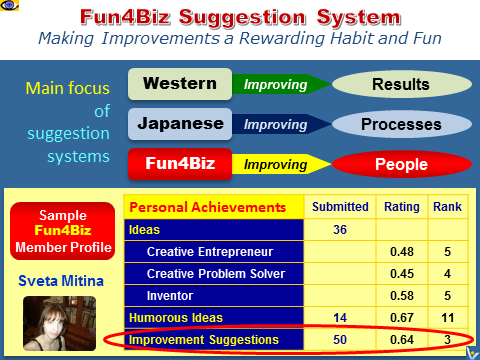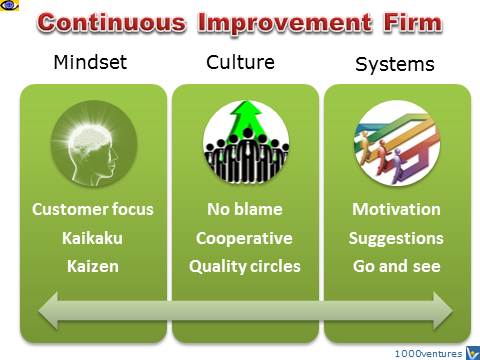| |
|
Continuous Improvement Firm (CIF)
Examples of Successful
Implementation
|
|
|
| |
Fun4Biz Suggestion System
Innovative
IT-powered Fun4Biz suggestion system focuses on
improving people. It’s all about attitude
motivation, achievement, continuous growth,
transparency, recognition and involvement. |
|
 |
| |
At Fidelity
Investments commitment to
Kaizen is reflected in its performance
management and compensation systems. Each fall,
Fidelity companies establish business goals for
the coming business year. These goals are tiered
through the company's various divisions down to
the individual manager level. Many of these
goals are focused on improvements in existing
products or processes...
More |
|
|
|
|
|

GE
Work-Out
As
→
Jack Welch
began to recognize that employees were an important source of brainpower for
new and creative ideas, he wanted to create an environment that pushes
towards "a relentless, endless companywide search for a better way to do
everything we do." The Work-Out program was a way to
reduce bureaucracy and give every
employee, from managers to factory workers, an opportunity to influence and
improve GE's day-to-day operations,
and reinvent continuously ever-more-effective ways of doing
business.
At its core, Work-Out is a very simple concept
based on the premise that those closest to the work know it best. When the
ideas of those people, irrespective of their functions and job titles, are
solicited and turned immediately into action, an unstoppable wave of
creativity,
energy, and
productivity is
unleashed throughout the organization. At GE, Work-Out "Town Meetings" gave
the corporation access to an unlimited resource of imagination and energy of
its talented employees...
More
Dell
Inc.
"To motivate an employee to think like an
owner, you have to give her metric she can embrace," says
Michael Dell, Founder of
Dell Computer
Corporation. "At Dell, every employee's incentives and compensation are
tied to the health of the business. We explained specifically how everyone
could contribute: by reducing cycle times,
eliminating scrap and waste, selling more, forecasting accurately,
scaling operating expenses, increasing inventory turns, collecting
accounts receivables efficiently, and doing things right the first time. And
we make it the core of our incentive program for all employees."6
"Constantly
question – even the good stuff," advises Michael Dell. "There's no
better way to improve. And don't try to cover up bad news or deny difficult
problems. Time is everything – the sooner you deal with an issue, the sooner
it's resolved."
>>>
|
Ford
Electronic Manufacturing Corp.
The
→
80/20 Principle
is used in many corporate
→
quality management
programs. In
Ford Electronic Manufacturing Corporation's quality program that won the
Shingo prize,
just-in-time programs have been applied using the 80/20 rule (80% of the
value is spread over 20% of the volume) and top-dollar usages are analyzed
constantly. "Labor and overhead performance were replaced by Manufacturing
Cycle Time analysis by product line, reducing product cycle time by 95%."
>>>
BBC
When Greg Dyke became director-general of the BBC in 2000 he went to every
major location and assembled the staff. He did make any presentation. He
simply asked employee a question. "What is the one thing I should do to make
things better for you?" Then he listened. He followed this with another
question, "What is the one thing I should do to make things better for our
viewers and listeners?"
Inland Empire Health Plan (IEHP)
The IEHP
Team Culture supports a system
to provide the best health care possible to people who need IEHP's
collective support.
Below are the highlights that create and
maintain the IEHP Team Culture:
AVIS
In 1963, Avis Rent A Car System, Inc. debuted a new advertising campaign
that featured a brand-new tagline – "We Try Harder." For Avis, the
tagline is more than a
→
slogan
– it has become part of the fabric of the
company that both reflects and influences
corporate values
→
values
and business
→
decisions ...
More
Maintaining and improving
operational efficiencies is the key
to
→
sustainable competitive advantage
of Amazon.com. The ability to offer shopping convenience, ease of purchase,
speed, decision-enabling information, a wide selection, discounted pricing, and
reliability of order fulfillment are all tied directly to the company's
logistical competencies...
More
"Great Game of Business"
Jack Stack, the President and CEO of engine
rebuilder SRC Corporation, developed an
employee-empowerment program known as the "Great Game of Business." Two
of its tenets are:
-
We want get rid of the "employee"
mentality. Each person thinks and acts like an owner.
-
We want to create and distribute wealth. Productivity improves as
employees work to create an organization based on continuous improvement
and on helping one another...
More
|
|
|